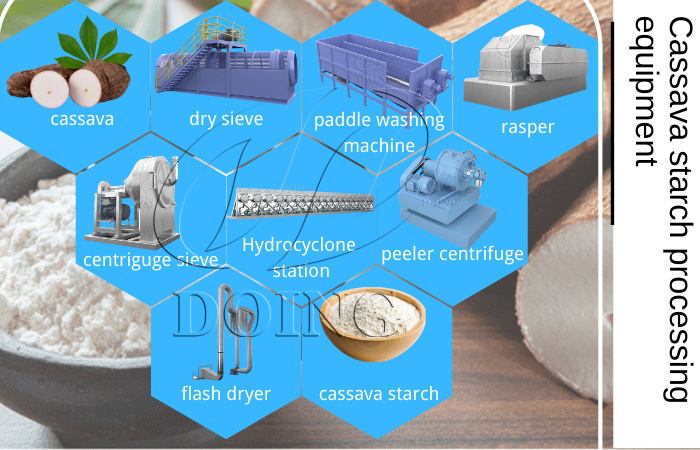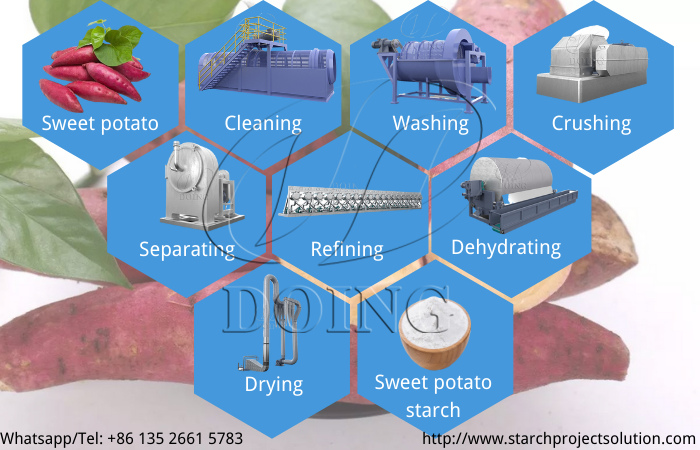 Tel/WhatsApp
Tel/WhatsApp
The 2 in 1 production line for starch extraction
Given that each starch raw material has its unique growth cycle, which in turn leads to varying processing cycles throughout the year, it becomes a challenge to utilize a single set of equipment to process two different crops efficiently.
The solution lies in staggering the processing times for these crops, thereby optimizing the starch extraction production line's efficiency and addressing the issue of prolonged downtime. Today, we will delve into a 2 in 1 production line for starch extraction by processing cassava and sweet potatoes to produce starch.
 Cassava starch production line
Cassava starch production line
To begin with, cassava and sweet potatoes have distinct characteristics, with cassava possessing a harder inner skin. However, since the production of starch does not necessitate peeling, this significant difference becomes irrelevant. The process simply involves cutting the cleaned roots directly and then crushing them using a grinding machine to proceed to the next stage.
Subsequently, the slurry resulting from the crushed cassava or sweet potato powder is fed into a centrifugal sieve. This equipment separates the starch from the fiber effectively. Following this, the mixture passes through a fine residue sieve to eliminate the coarser fibers, leaving behind a rough cassava or sweet potato starch slurry.
 Sweet potato starch production line
Sweet potato starch production line
This rough cassava or sweet potato starch slurry then enters a cyclone, where it undergoes the separation of proteins and cytosol. By removing these components using the cyclone, a clean cassava or sweet potato starch emulsion is obtained.
The starch emulsion is then dehydrated to a wet starch form with approximately 38% moisture content through the use of a scraper centrifugal sieve. Finally, the wet starch is transferred to a starch dryer to be dried thoroughly, resulting in the production of dry cassava or sweet potato starch.
The 2 in 1 production line for starch extraction can effectively save customer budget and improve starch production efficiency. If you need it, please contact us.
-
 Garri Processing vs. Cassava Starch Processing: Which is More Profitable and Easier to Start?
Garri Processing vs. Cassava Starch Processing: Which is More Profitable and Easier to Start?
-
 Investing in Cassava Starch Processing? Start with the Key Equipment for Success in Vietnam/Thailand Markets
Investing in Cassava Starch Processing? Start with the Key Equipment for Success in Vietnam/Thailand Markets
-
 The Potato Starch Processing Opportunity in 2025: Benefits and Challenges
The Potato Starch Processing Opportunity in 2025: Benefits and Challenges
-
 How to Choose Cassava Starch Processing Machine with Limited Capital to Cater for Both Farmers and Market?
How to Choose Cassava Starch Processing Machine with Limited Capital to Cater for Both Farmers and Market?
-
 Sustainable & Eco-Friendly Cassava Processing Solutions
Sustainable & Eco-Friendly Cassava Processing Solutions
-
 Solving 5 Common Challenges in Garri Processing with Modern Machinery
Solving 5 Common Challenges in Garri Processing with Modern Machinery
-
 Advantages of Cassava Starch Separating Machine - Centrifuge Sieve
Advantages of Cassava Starch Separating Machine - Centrifuge Sieve
-
 What is the capacity of cassava slicer manufactured by Henan Jinrui?
What is the capacity of cassava slicer manufactured by Henan Jinrui?
-
 How Much is the Cassava Agro Processing Machine Used for Cassava Flour Production?
How Much is the Cassava Agro Processing Machine Used for Cassava Flour Production?
-
 Which state in Nigeria produce the most cassava?
Which state in Nigeria produce the most cassava?
-
 Henan Jinrui delivers attieke processing equipment to the customer in Côte d'Ivoire
Henan Jinrui delivers attieke processing equipment to the customer in Côte d'Ivoire
-
 Henan Jinrui Successfully Ships Cassava Flour Processing Line to Madagascar Client
Henan Jinrui Successfully Ships Cassava Flour Processing Line to Madagascar Client
-
 Henan Jinrui Advanced Cassava Starch Processing Equipment Wins Over Nigerian Food Processor
Henan Jinrui Advanced Cassava Starch Processing Equipment Wins Over Nigerian Food Processor
-
 Henan Jinrui Delivers Custom 1TPD Garri & Attieke Making Equipment to Benin
Henan Jinrui Delivers Custom 1TPD Garri & Attieke Making Equipment to Benin
-
 Henan Jinrui Secures Order from Benin for 1-Ton Daily Garri and Attieke Processing Machines
Henan Jinrui Secures Order from Benin for 1-Ton Daily Garri and Attieke Processing Machines
CONTACT US
DOING company offers cassava processing machine from single machine to the complete production line. If you want to get more details about cassava processing machine, please contact us:
- Do you want to buy machine?
- Yes, I want to buy machine
- No, I want to learn more in advance.
- What is your raw material?
- Cassava
- Potato
- Sweet potato
- Others
- 2. What is the final product you want to produce?
- Garri
- Cassava flour
- Cassava starch
- Cassava chips
- Attiekie
- Bammy
- Others
- 3.What is your capacity plan?
- Small scale garri machine
- 1ton per day
- 2tons per day
- 3tons per day
- 10tons per day
- 20tons per day
- Others
- 3.What is your capacity plan?
- Small scale
- 5tons per day
- 10tons per day
- 20tons per day
- 50tons per day
- 100tons per day
- Others
- 3.What is your capacity plan?
- Small scale
- 5tons per day
- 10tons per day
- 20tons per day
- 50tons per day
- 100tons per day
- 200tons per day
- 300tons per day
- Others
- 3.What is your capacity plan?
- Small scale
- Middle type
- Large scale
- What is your capacity plan?
- Small scale
- 5tons per day
- 10tons per day
- 20tons per day
- 50tons per day
- 100tons per day
- 200tons per day
- 300tons per day
- Others








